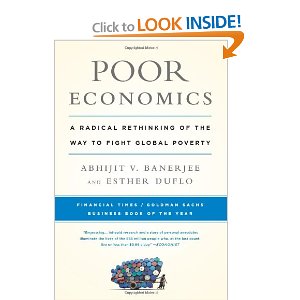
Abhijit Banerjee and Esther Duflo
4.0 out of 5 stars Serious Economics Poorly Presented, December 14, 2012
I have no doubt that among economists this book merits all the praise it has received; I do NOT recommend it for the general reader, indeed, I do not recommend it at all unless it is assigned reading, in which case my recommendation is moot. The book is neither as radical as its title pretends, nor as detailed as I was hoping for–how, exactly, do the one billion poor spend their 99 US cents a day? I bought the book because I am thinking about how to persuade Sir Richard Branson that he should sponsor “The Virgin Truth” [one pager concept has been posted online]; go “all in” on all the Opens including Open Base Transceiver Station, Open Spectrum, Open Software, etcetera [topic of my most recent book], and give each of the five billion poor free cell phone access and free education “one cell call at a time” as conceptualized by the Earth Intelligence Network. For me, this book is a four and not light reading. All text, few charts, no lists, no comparatives, no visualization.
The authors take one really brilliant idea and then talk around it, and that is why they lose one star. The brilliant idea is that we really do need to understand at a micro level how the just under one billion extreme poor spend their 99 cents a day (the other four billion less poor live on $2 to $20 a day), and how they make their choices, choices that often reject tiny investments in prevention (chloriating their water, for example) with the result that they end of losing work and spending more on remediation after the fact. YES! I agree. They then proceed to answer, at best, 20% of the question.
The big take-away for me–I was absolutely delighted to see this smessage repeated throughout the book–was how a tiny bit of information can make a world of difference, both in the choice that an individual poor person makes, and in the eradication of corruption once detailed numbers are published about what *should* have reached each schoolhouse in any given district. In other words, and this is NOT the key point of the book, but rather my key point: without changing a single institution, without redirecting a single dollar, the simple implementation of an information transparency regime changes everything. Now THAT is a book I hope these two authors will write soon, and that book will probably join my 10% “Beyond 5 Stars.” [I read in 98 categories, just one of them fiction, access all my reviews and their Amazon pages by category at Phi Beta Iota, here are just two: Nature, Diet, Memetics, Design (206); Peace, Poverty, & Middle Class (253).
Continue reading “Review: Poor Economics – A Radical Rethinking of the Way to Fight Global Poverty”

